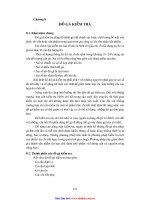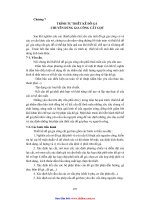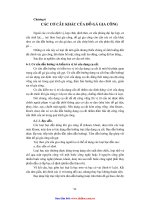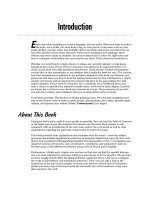Giáo trình động từ tiếng Pháp - Part III Taking a Look Back: The Past Tenses - Chapter 14 doc
Bạn đang xem bản rút gọn của tài liệu. Xem và tải ngay bản đầy đủ của tài liệu tại đây (192.61 KB, 8 trang )
Chapter 14
Deciphering the Literary Tenses:
The Passé Simple and
Passé Antérieur
In This Chapter
ᮣ Conjugating the passé simple
ᮣ Forming the passé antérieur
F
rench has some tenses that are reserved for writing only. The passé simple and the
passé antérieur, or past anterior, are two such tenses. You only need to recognize them
in case you ever curl up with your favorite French novel or short story.
The passé simple is a literary tense that expresses a completed action in the past. In fact, it
has the same meaning as the passé composé, which is a compound tense. Meanwhile, the
passé antérieur is the past of the passé simple. You use it when one action in the past has to
happen before another action takes place in the past. This chapter does have a short sec-
tion on it just so that you can identify it when you see it.
Because they’re both literary tenses, you don’t use them in everyday conversation. This
chapter briefly looks at the passé simple and passé antérieur and helps you identify and
conjugate them in case you do encounter them.
Creating the Passé Simple
As the name indicates, the passé simple is a simple verb, which means that the verb is
conjugated by itself without an auxiliary. If you have never seen the passé simple before, it
can seem very odd (especially the plural endings). This section helps you recognize it. And
don’t worry about using it too much in your own writing. You can use the passé composé
instead to express a completed action in the past. Check out Chapter 13 for more on the
passé composé. This section shows you how to conjugate the passé simple for regular and
irregular verbs.
Regular verbs
The passé simple of regular verbs is fairly easy to form. Just drop the -er, -ir, and -re of the
infinitives and add the endings. However,
-er verbs have different endings than -ir and -re
verbs. The following charts show you the different endings.
20_773883 ch14.qxp 8/2/06 1:34 PM Page 163
Regular -er Verb Endings for the Passé Simple
je -ai nous -âmes
tu -as vous -âtes
il/elle/on -a ils/elles -èrent
parler (
to speak
)
je parlai nous parlâmes
tu parlas vous parlâtes
il/elle/on parla ils/elles parlèrent
Il parla de la politique française. (
He spoke about French politics.
)
Regular -ir and -re Verb Endings for the Passé Simple
je -is nous -îmes
tu -is vous -îtes
il/elle/on -it ils/elles -irent
finir (
to finish
)
je finis nous finîmes
tu finis vous finîtes
il/elle finit ils/elles finirent
Mes grands-parents finirent la construction de leur maison avant la guerre.
(
My grandparents finished building their house before the war.
)
vendre (
to sell
)
je vendis nous vendîmes
tu vendis vous vendîtes
il/elle/on vendit ils/elles vendirent
La France vendit la Louisiane aux États-Unis en 1803.
(
France sold Louisiana to the United States in 1803.
)
Most irregular verbs
You form the passé simple of most irregular verbs by taking their past participles and
adding endings. If the past participle of a verb ends in
u, add the following endings:
-s, -s, -t, -ûmes, -ûtes, -rent.
164
Part III: Taking a Look Back: The Past Tense
20_773883 ch14.qxp 8/2/06 1:34 PM Page 164
boire (
to drink
)
je bus nous bûmes
tu bus vous bûtes
il/elle/on but ils/elles burent
Nous bûmes un Dom Perignon pour nos cinquante ans de mariage.
(
We drank Dom Perignon champagne for our 50th wedding anniversary.
)
You also use these same endings for avoir, whose past participle ends in u.
avoir (
to have
)
j’eus nous eûmes
tu eus vous eûtes
il/elle/on eut ils/elles eurent
Vous eûtes votre diplôme avant la manifestation des étudiants.
(
You got your degree before the students’ protest.
)
The passé simple of être is irregular, although the endings are the same as avoir.
être (
to be
)
je fus nous fûmes
tu fus vous fûtes
il/elle/on fut ils/elles furent
Il fut Président de la République Française en 1945.
(
He was President of the French Republic in 1945.
)
Table 14-1 lists some verbs whose past participles end in u and thus follow the same
pattern as
boire (to drink).
Table 14-1 Verbs with Past Participles That End in u
Infinitive Past Participle Stem
boire (
to drink
) bu-
connaître (
to know
) connu-
courir (
to run
) couru-
croire (
to believe
) cru-
devoir (
to owe, to have to
) dû-
falloir (
to have to, to must
)* fallu-
lire (
to read
) lu-
paraître (
to appear, to seem
) paru-
(continued)
165
Chapter 14: Deciphering the Literary Tenses: The Passé Simple and Passé Antérieur
20_773883 ch14.qxp 8/2/06 1:34 PM Page 165
Table 14-1
(continued)
Infinitive Past Participle Stem
plaire (
to please
) plu-
pleuvoir (
to rain
)* plu-
pouvoir (
to be able to
) pu-
recevoir (
to receive
) reçu-
savoir (
to know
) su-
vivre (
to live
) vécu-
vouloir (
to want to
) voulu-
* These verbs are used in the third person singular (il) only.
Irregular stem verbs with regular endings
Some verbs have an irregular stem but regular endings: -is, -is, -it, -îmes, -îtes, and
-irent. Dire (to say) is a good example.
dire (
to say
)
je dis nous dîmes
tu dis vous dîtes
il/elle/on dit ils/elles dirent
Elle dit au revoir à ses amis avant de partir.
(
She told her friends goodbye before leaving.
)
Table 14-2 lists some verbs similar to dire.
Table 14-2 Verbs with Irregular Stems and Regular Endings
Infinitive Stem
craindre (
to fear
) craign-
dire (
to say
) d-
écrire (
to write
) écriv-
faire (
to do, to make
) f-
mettre (
to put, to place
) m-
naître (
to be born
) naqu-
prendre (
to take
) pr-
rire (
to laugh
) r-
voir (
to see
) v-
166
Part III: Taking a Look Back: The Past Tense
20_773883 ch14.qxp 8/2/06 1:34 PM Page 166
Completely irregular
The passé simple of the verbs venir (to come) and tenir (to hold) and all their com-
pounds are irregular and have different endings. The endings are as follows:
-ins, -ins,
-int, -înmes, -întes,
and -inrent.
venir (
to come
)
je vins nous vînmes
tu vins vous vîntes
il/elle/on vint ils/elles vinrent
Ils vinrent avant le coucher du soleil. (
They came before sunset.
)
Put the following verbs in the passé simple.
Q. Nous _________________ (avoir) de la chance.
A. Nous eûmes de la chance. (We were lucky.)
1. Il _________________ (naître) le 3 décembre, 1816.
2. Les enfants _________________ (craindre) les histoires d’épouvante.
3. Vous _________________ (voir) des tableaux au musée.
4. Vincent Van Gogh _________________ (envoyer) beaucoup de lettres à son frère Théo.
5. Gaugin _________________ (passer) beaucoup de temps à Tahiti.
6. Nous _________________ (faire) des costumes pour Mardi Gras.
7. Je _________________ (recevoir) des cadeaux pour mon anniversaire.
8. Mon grand-père _________________ (finir) ses études en 1923.
9. Il _________________ (être) stupéfait.
10. Elle _________________ (vivre) quarante ans en France.
Creating the Passé Antérieur
The passé antérieur is a compound tense, and it expresses an action that has taken
place even before the passé simple. The passé antérieur is also a literary tense, and
you don’t use it in conversational French. You need only to recognize it when you
come across it while reading your favorite French author(s). Like the passé simple,
you see it mostly in the third person singular and third person plural. Form it by put-
ting the auxiliaries
avoir and être in the passé simple and adding the past participle
of any verb of your choice. Remember to follow the same rules of agreement of the
past participle with the passé antérieur as you do with the passé composé or with
any comound past tense. (Check out Chapter 12 for the lowdown on the rules of
agreement.)
167
Chapter 14: Deciphering the Literary Tenses: The Passé Simple and Passé Antérieur
20_773883 ch14.qxp 8/2/06 1:34 PM Page 167
parler (
to speak
)
j’eus parlé nous eûmes parlé
tu eus parlé vous eûtes parlé
il/elle/on eut parlé ils/elles eurent parlé
Il eut parlé au peuple à la radio avant d’apparaître à la télévision.
(
He had spoken to the people on the radio before appearing on television.
)
partir (
to leave
)
je fus parti(e) nous fûmes partis(es)
tu fus parti(e) vous fûtes parti(e)(s)(es)
il/elle/on fut parti(e) ils/elles furent partis(es)
Ils furent partis avant l’ouragan. (
They had left before the hurricane.
)
Because the passé antérieur expresses an action that has taken place before the action
of the passé simple, you generally use it after the following conjunctions:
quand
(when), lorsque (when), après que (after), dès que (as soon as), and à peine . . . que
(hardly). With the expression à peine . . . que, you have to invert the subject and the
conjugated verb. This is similar to what you do in English with this expression. Look at
the following example and its translation in English.
À peine eut-il fini sa pièce, qu’il la présenta au roi. (Hardly had he finished his
play, when he presented it to the king.
)
Quand les étudiants eurent manifesté, les ouvriers les suivirent. (When the
students protested/had protested, the workers followed them.
)
Choose between the passé simple and the passé antérieur forms of the verbs in
parentheses and conjugate them.
Q. Lorsque son père _________________ (laisser) ses clés, Sébastien les _________________
(prendre).
A. Lorsque son père eut laissé ses clés, Sébastien les prit. (When his father had left the keys,
Sébastien took them.
)
11. A peine qu’il _________________ (sortir), que le téléphone _________________ (sonner).
12. Lorsque le patron _________________ (surveiller) les employés, ils _________________
(travailler) attentivement.
13. Après qu’ils _________________ (finir) leur travail, ils _________________ (être) payés.
14. Quand nous _________________ (décider) de voyager, nous _________________ (choisir)
l’Asie.
15. Dès qu’elle _________________ (finir) ses études, elle _________________ (trouver) du
travail.
168
Part III: Taking a Look Back: The Past Tense
20_773883 ch14.qxp 8/2/06 1:34 PM Page 168
Answer Key
This section contains the correct answers to the practice problems in this chapter.
a
Il naquit le 3 décembre, 1816. (He was born on December 3, 1816.)
b
Les enfants craignirent les histoires d’épouvante. (The children feared the horror stories.)
c
Vous vîtes des tableaux au musée. (You saw paintings at the museum.)
d
Vincent Van Gogh envoya beaucoup de lettres à son frère Théo. (Van Gogh sent many letters to
his brother Théo.
)
e
Gaugin passa beaucoup de temps à Tahiti. (Gaugin spent a lot of time in Tahiti.)
f
Nous fîmes des costumes pour Mardi Gras. (We made costumes for Mardi Gras.)
g
Je reçus des cadeaux pour mon anniversaire. (I received gifts for my birthday.)
h
Mon grand-père finit ses études en 1923. (My grandfather finished his studies in 1923.)
i
Il fut stupéfait. (He was astonished.)
j
Elle véçut quarante ans en France. (She lived in France for forty years.)
k
A peine fut-il sorti, que le téléphone sonna. (Hardly had he left, when the telephone rang.)
l
Lorsque le patron eut surveillé les employés, ils travaillèrent attentivement. (When the boss
had kept a watch on the employees, they worked attentively.
)
m
Après qu’ils eurent fini leur travail, ils furent payés. (After they had finished their work, they
were paid.
)
n
Quand nous eûmes décidé de voyager, nous choisîmes l’Asie. (When we had decided to travel,
we chose Asia.
)
o
Dès qu’elle eut fini ses études, elle trouva du travail. (As soon as she had finished her studies,
she found a job.
)
169
Chapter 14: Deciphering the Literary Tenses: The Passé Simple and Passé Antérieur
20_773883 ch14.qxp 8/2/06 1:34 PM Page 169
170
Part III: Taking a Look Back: The Past Tense
20_773883 ch14.qxp 8/2/06 1:34 PM Page 170









